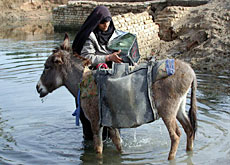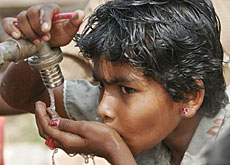Aid groups want end to water privatisation

Swiss aid agencies attending the World Social Forum in Brazil have thrown their weight behind a convention outlawing water privatisation.
The stance is at odds with the position favoured by the Swiss government, which supports private-public partnerships.
In 2000 the United Nations set as one of its Millennium Development Goals to half the number of people who don’t have access to fresh water. But Swiss aid groups say little progress has been made since then.
“The private sector is beginning to gain more and more influence at conferences,” said Rosemarie Bär of the Swiss coalition of development organisations.
Bär, who is attending the global gathering in Porto Alegre, said the World Bank and the International Monetary Fund were now putting pressure on developing countries to privatise water supplies in return for debt relief.
According to Bär, 80 per cent of people who don’t have access to water live in the countryside and do not represent a viable customer base for the private sector.
She added that if the resource fell into private hands, prices would rise and quality would sink.
Bär cited failed privatisations in Mozambique and the Philippines as proof of what could go wrong.
“Water is essential to man’s existence and should be controlled by the state,” she insisted.
Private-public
The Swiss Agency for Development and Cooperation (SDC), however, takes a different approach.
In the corridors of the World Economic Forum in Davos, it is pushing for businesses to get more involved in development work.
According to SDC representatives in Porto Alegre, supplying people with water forms part of this concept.
“The Millennium goals can only be achieved if all the different actors work together,” said Marco Rossi of the SDC.
Rossi added that the public sector was often not in a position to build new supply networks, or to find and deliver new sources of water.
“The private sector can play an import role in this area,” he said.
Rossi added that a lack of good infrastructure meant populations living in poor countries had to rely on water tankers and ended up paying a lot more.
The SDC says it has drawn up a strict code of conduct, and firms applying for lucrative contracts are also bound to carry out work in poorer regions.
swissinfo with agencies
According to the WHO, 1.4 billion people do not have access to clean drinking water.
30,000 people, including 8,000 children, die from drinking polluted water.
Switzerland spends 0.38% of its GDP on development, just over half of the international target of 0.7%.
Swiss church charities have launched a postcard campaign at the WSF to remind governments around the world of the Millennium Development Goals to combat poverty.
According to the WHO, a person needs a minimum of 50 litres of water a day to drink, wash and clean food.
A private-public partnership supported the SDC in the Bolivian capital, La Paz, collapsed recently following large-scale protests over high water prices.

In compliance with the JTI standards
More: SWI swissinfo.ch certified by the Journalism Trust Initiative

You can find an overview of ongoing debates with our journalists here . Please join us!
If you want to start a conversation about a topic raised in this article or want to report factual errors, email us at english@swissinfo.ch.